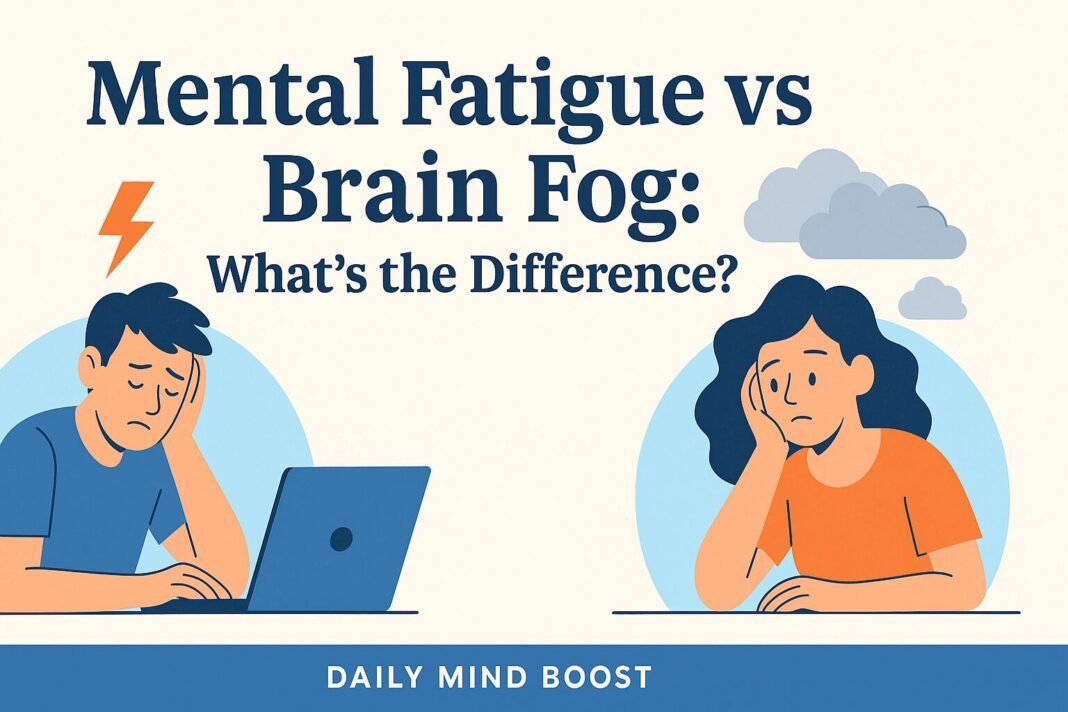Table of Contents
Ever feel like your brain just hits a wall by 2PM?
Mental Fatigue vs Brain Fog: One day you can power through a to-do list with no issue, and the next, you’re rereading the same sentence for the fifth time. Is it burnout? A bad night’s sleep? Or is it… brain fog?
If you’ve ever used the terms mental fatigue and brain fog interchangeably, you’re not alone. But while they can feel similar, understanding the distinction between the two can help you manage both more effectively. This post breaks down the difference — and what to do about each.
Why Mental Fatigue vs Brain Fog Matters
Knowing whether you’re dealing with mental fatigue or brain fog can help you fix the root problem faster.
Both impact your ability to focus, think clearly, and get things done. But they show up for different reasons. If you’re treating one like the other — for example, trying to “think harder” when what you need is rest — you’re more likely to stay stuck in the fog.
Most people overlook these subtle differences. That’s where your clarity starts.
Signs This May Be Affecting You
Here’s how to tell which one might be dragging you down:
Signs of Mental Fatigue:
- You’ve been “on” mentally all day with no break
- You feel tired even though you’re not physically active
- Everything takes extra effort to concentrate on
- You feel burnt out by constant decision-making
Signs of Brain Fog:
- You feel cloudy even after decent sleep
- You struggle to organize your thoughts
- You forget small things often (where you put your keys, what you were saying mid-sentence)
- Your mind feels sluggish or stuck in slow motion
The Connection Between Overload and Brain Fog
Mental fatigue is usually the result of cognitive overuse — working long hours, multitasking, or too much screen time. It’s your brain’s version of muscle exhaustion. Research from the University of Cambridge shows that prolonged mental work increases glutamate buildup in the brain, which can make decision-making and focus harder.
Brain fog, on the other hand, tends to be more systemic. It may stem from diet, lack of sleep, inflammation, or hormonal shifts. One study published in Frontiers in Neuroscience connects brain fog symptoms to imbalances in glucose metabolism and oxidative stress — your brain literally isn’t firing optimally.
Think of fatigue as “brain overuse” and fog as “brain underfunction.”
What You Can Do About It
Here are targeted tips depending on which one you’re experiencing:
1. For Mental Fatigue: Do a “Cognitive Reset”
Take a 5–10 minute break without screens. Go outside. Breathe deeply. Let your mind rest. Try the “20-20-20” rule: every 20 minutes, look at something 20 feet away for 20 seconds.
2. For Brain Fog: Fuel + Hydrate Smart
Eat a small protein-rich snack and drink water. Fog often gets worse with blood sugar drops or dehydration. Try a boiled egg, nuts, or a protein bar with water or herbal tea.
3. For Both: Try Box Breathing
Inhale for 4 seconds, hold 4, exhale 4, hold 4. Repeat for 1–2 minutes. This reduces nervous system tension and re-centers your focus.
4. For Mental Fatigue: Close the Mental Tabs
Write down everything swirling in your head. A simple brain dump can free up bandwidth.
5. For Brain Fog: Get Natural Light
Five minutes of outdoor light — even on a cloudy day — can regulate your circadian rhythm and reset alertness.
Brain Fog Triggers vs. Clear Mind Boosters
| Fog Trigger | Alternative | Why It Helps |
|---|---|---|
| Multitasking | Single-task sprint | Reduces decision fatigue |
| Sugary snacks | Protein + fat combo | Keeps energy stable |
| Skipping breaks | Scheduled pauses | Prevents overload |
| Afternoon coffee | Herbal tea + walk | Boosts blood flow naturally |
Conclusion
You don’t need to guess anymore — brain fog and mental fatigue may feel alike, but they need different solutions.
Next time your mind slows down, ask yourself: Am I running on empty, or is something blocking the signal?
Try one small shift based on what you learn here — and observe how your focus responds over the next 3–5 days.
Want more daily mental clarity tips? Subscribe to Daily Mind Boost.
Need a full reset? Read: What Is Brain Fog? Symptoms, Causes & How to Clear It





